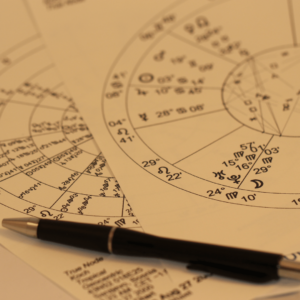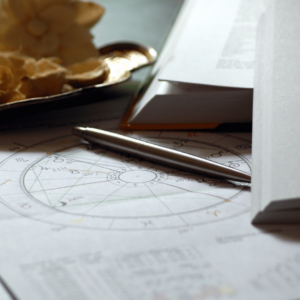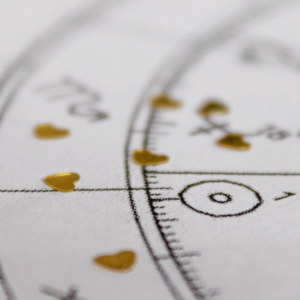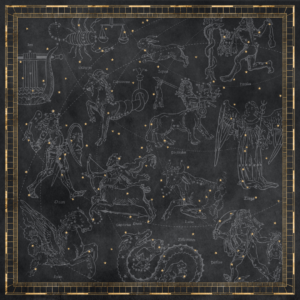What is Astrology?
I. Introduction
In accordance with the Hermetic Principle, “as above, so below,” human beings throughout recorded history have looked to the sky for a reflection of life on Earth. They’ve observed the correlations between the ever-changing starry landscape and the tides of their own personal and collective lives. They’ve encoded the wisdom they found in stories that astrologers today are still unpacking and weaving into the contemporary world.
There's not just one universal astrology – different systems have emerged in different parts of the world at different times. Each of these systems has a unique symbolic language it uses to describe the relationship between astronomical events and human affairs. Most of them have less to do with the personal lives of humans than the astrology we know from newspaper horoscopes, focusing instead on marking time via the planets and stars, in the same way we might use a clock or calendar.
But for the purposes of introducing you to this powerful practice as we know it, in this article we’ll focus on Western Astrology as it evolved from the ancient cultures of the Mediterranean and Fertile Crescent to today.
A. Definition of Astrology
Astrology is the ancient art and science of tracking the movements and relationships of celestial bodies in order to better understand life on Earth. The practice we are describing here dates back to ancient civilizations such as the Babylonians, Egyptians and Greeks, but many, many cultures around the world have developed their own unique astrologies independently of each other, and many of those systems are still in practice in different parts of the world today.
The zodiac is a set of archetypes or “signs” which rule over different parts of the sky and represent units of time, or seasons. The western zodiac follows the ecliptic, an approximation of the Sun’s path around the sky divided into twelve equal parts, each associated with a particular sign. So when you hear an astrologer say, for example, “Aries season,” what they typically mean is the unit of time (approximately one month) when the Sun is moving through the part of the sky associated with the zodiac sign of Aries.
The zodiac signs are arranged in the following order in the sky, and professional astrologers can explain the significance of this order in a variety of different ways. The full complexity of this cycle is beyond the scope of this article, but for now all you need to know is that these signs, together, form a cyclical process that is reflected in earthly events, and that astrology is the study of that reflection.
- Aries
- Taurus
- Gemini
- Cancer
- Leo
- Virgo
- Libra
- Scorpio
- Sagittarius
- Capricorn
- Aquarius
- Pisces
These signs form the backdrop against which astrologers measure the movements of the planets and their changing relationships with each other. Picture an analog clock in which the signs are the numbers around the edge and celestial objects are the hands, each moving around the circle at their own pace. Astrology is just like that, except this clock is harder to read and gives us a lot more information than the ones we might be used to!
B. Brief history of Astrology

Astrology is often compared to a language, and like every language it is ever-evolving. Western astrology dates back to the earliest known people of the Fertile Crescent. The Babylonians, who lived in Mesopotamia (the area currently known as Iraq) around the 5th century BCE, developed and recorded the earliest version of this system of astrology, and their influence can still be seen in the astrology we use today.
The Greeks made significant contributions to the development of astrology which was also influenced by Egyptian mythology. All of the diverse influences that informed Hellenistic astrology were later adapted and codified into a state religion by the Roman Empire (though it's worth noting that during this time there were still people practicing astrology against and outside of the Roman system). In the centuries that followed, astrology spread throughout Europe, where it was upheld by the Catholic Church during the medieval period, evolving at each step and eventually making its way to the United States.
Today, astrology continues to evolve as more objects in space are discovered, named and incorporated into the language. Contemporary astrologers have the opportunity to meet and get to know these new objects, to gain knowledge of them through research and experience and share that knowledge with the world for the first time. So, to participate in the practice of astrology is to become a part of its history.
C. Overview of Astrology's impact on society
Historically, astrology was frequently used by monarchs and other political leaders to make decisions, as well as to understand and predict natural phenomena such as droughts, eclipses, agricultural yields and the changing of the seasons. These days, astrology is best known as a tool for personal growth and self-discovery, though astrologers still make predictions based on the planets and stars. Astrology can provide insight into your relationships, career, and life path as well as a spiritual connection to the living cosmos.
In recent years, astrology has experienced a surge in popularity thanks to the many young astrologers who are sharing their work online. But despite its popularity, astrology remains a controversial subject. There are many different possible viewpoints on astrology: some people view it as a pseudoscience, others as a valuable tool for understanding the world and our place in it, still others as a spiritual or mystical practice that guides their life.
Even among astrology fans, there is no scientific explanation for how astrology works or even a single interpretive system that's agreed upon. Astrology is truly open-source in the sense that each human mind will have its own relationship to both the various planets and the terrestrial events that those planets and their movements reflect. So every practitioner of astrology will add something unique to the study as a whole, and build upon the knowledge that is available for all of us.
II. The Basics of Astrology

A. Zodiac signs
The zodiac is a circular cross-section of the sky representing the path the Sun and Moon travel around the Earth every year. This circle is divided into twelve equal parts, each associated with a particular sign of the zodiac. Each sign corresponds to a roughly month-long season based on the length of the Sun’s transit through that part of the sky, and an ever-evolving set of qualities, characteristics and processes that are associated with that season in the northern hemisphere.
Most people know their Sun sign, which you can find by looking at the month and day of your birth, but every astrological chart contains all twelve signs and many of those signs will be occupied by different planets. So it may be true that you are a Cancer Sun, but you also have a Moon sign, a Venus sign, a Mars sign, etc – which will give you a much deeper understanding of your cosmic signature than your Sun sign alone.
The signs, taken together, tell a story, and every astrologer will interpret this story in a slightly different way. They are divided into four elements and three modalities, each of which has their own significance. For example, earth signs are typically associated with material conditions while air signs are more connected to social life and relationships. Water signs are associated with emotions and spirituality while fire signs correspond to creativity and passion.
That's just one surface-level explanation of the signs and their elements. For a more detailed introduction to the signs and their relationships to each other, we recommend Secrets of the Zodiac, an online astrology course taught by Kathryn Andren available in the Astrology Hub Academy.
B. Planets and their meanings
In the Roman astrological system, the planets were equated with the gods. So their movements were considered to have a significant impact on human and earthly life. The seven traditional planets in astrology are the Sun, Moon, Mercury, Venus, Mars, Jupiter, and Saturn. There are also three “modern” planets, which were not known by ancient astrologers but which have been incorporated into many modern astrology practices: Uranus, Neptune and Pluto. Each planet is associated with a specific archetype, which has its own characteristics, mythologies, and role to play.
There are many more celestial bodies used in astrology than these, including asteroids, fixed stars and even points in space where no physical object exists (such as the Nodes of the Moon or Black Moon Lilith), but which are observed in astronomy and given astrological symbolism. Not all astrologers work with all of these bodies or points; each practitioner decides for themselves what is useful for their unique practice.
C. Houses and their meanings
The twelve houses of the astrological chart represent different areas of a person's life, such as relationships, career, health, and spirituality. Modern astrologers sometimes associate the twelve houses with the twelve signs, with Aries (the first sign) being associated with the first house, Taurus with the second, and so on, but this association only emerged in the 20th century. Traditionally, the houses were associated with planets rather than signs.
Astrologers look at the houses in an astrological chart in order to determine what area of earthly life will be impacted by the celestial events taking place in that part of the sky. Unlike the signs, the houses are unique to each chart, because they describe the local sky in the specific place and time of a person's birth. Astrologers who work in more concrete predictive modes, such as Financial Astrology or Medical Astrology, might focus on the houses more than others, because the houses are tied to the Earth and so specific to an individual's earthly experience.
House systems and houses can be one of the more complex and challenging foundational pieces of astrology for newcomers to understand. For a deeper explanation of the houses, check out the House Series on the Astrology Hub Podcast, particularly this episode, for an overview of what the houses are and their significance in chart interpretation.
D. Aspects and their meanings
The practice of astrology is all about relationships – relationships between the planets, between the signs, between the planets AND the signs, and even more layers of interaction that reveal themselves the deeper you go!
Aspects are the relationships between the positions of the planets in the sky at any given time. As the planets move around the zodiac, they make certain shapes and angles together, similar to the balls on a billiards table. Your natal chart is a snapshot of the moving sky at the moment you took your first breath, and so the aspects the planets were making at that moment will inform the structure of your chart, and influence your personality traits as well as your life on Earth.
Astrologers can also look at the relationships between celestial events as they happen in the present (or will happen in the future) and the structure of a natal chart, in order to see how a person will be impacted by the planets’ ongoing movements. These relationships can be harmonious or challenging, supportive or tense, and they can provide insight into the dynamics of your life, the events that unfold and how you are likely to react to them.
The most common aspects in astrology are the conjunction, sextile, square, trine, and opposition, but many astrologers use additional aspects including the quintile, septile and other harmonic aspects. For more on aspects and their influence on human affairs, we recommend Astrology Foundations with Rick Levine, a Master Astrologer and one of the foremost thinkers on harmonic aspects.
III. Interpreting Astrological Charts

A. Birth chart interpretation
A birth chart, also known as a natal chart or nativity, is a representation of the positions of the planets relative to the zodiac signs and the earth’s horizon at the exact time and place of a person's birth. In other words, it's like a snapshot of the living sky exactly as it was above your head while you were born.
Not all astrologers work with natal charts, but most do. Charts can be drawn for any moment in time, and sometimes astrologers will look at the chart of an important event in the past in order to understand its impact, or a moment in the future in order to make predictions about the influence of certain celestial events.
There are many, many different approaches to interpreting birth charts. Astrologers can use the information in your birth chart to gain insight into your life and character, including your strengths, challenges and life path. This information can support you in understanding yourself and developing your sense of purpose and connection to the Universe.
A birth chart reading from a qualified astrologer should always be delivered through an empowering lens that supports the client’s self-determination. It’s not an astrologer’s place to tell you who you are or what you must do, but to help you discover and express yourself in the most authentic way possible. Because there are so many different ways to approach this art form, if you’re seeking a reading, finding the right astrologer for you is key.
Astrologer Connect is an online reading service that can help you find a trusted astrologer who specializes in the area you're seeking support with. All practitioners featured on Astrologer Connect are professional astrologers with years (even decades) of experience, and each of them has been through a rigorous application process to ensure they are qualified to give high-quality readings.
B. Transit and progression interpretation
The birth chart, although it is a snapshot of the living sky, is not static. Rather, it continues to be impacted by time as it progresses, and by the celestial dance as it continues to unfold. Astrologers also use timing techniques such as transits and progressions to gain insight into the opportunities and challenges that may emerge in a person’s life at certain points in time, based on the evolution of the sky relative to that person's chart.
Transits refer to the current positions of celestial bodies and how they interact with the planets in a person's birth chart. An astrologer who is reading a chart's transits might look at which houses a certain planet is moving through in the chart at a certain time, or they might look at how the transiting planets aspect the planets in the chart. All of this information can be used to predict how those transits will impact the person's fate, or events that take place in their life during that period of time.
On the other hand, progressions refer to how a person's birth chart changes over time. There are different forms of progressions that astrologers use but most common are secondary progressions, which equate one day of planetary movement after birth with one year of a person's life. So, for example, if an astrologer wanted to use secondary progressions to make a prediction about the 30th year of your life, they would look at a chart of the local sky 30 days after you were born.
These are just two of the many techniques used to understand how a person's life changes and evolves, and to make predictions about the future. As with all other topics in astrology, methods for prediction and timing will vary from one astrologer to another, with certain techniques being shared among certain schools and some practitioners discovering and using their own proprietary knowledge.
C. Composite chart interpretation
A composite chart is created when two people's birth charts are combined using a method similar to a mathematical average to create a unique third chart that represents the relationship between them. This type of chart interpretation can be used to understand the dynamics of a relationship, its strengths and challenges, and to make predictions about its future.
Synastry is another method for reading compatibility. In a synastry reading, the two charts are compared to each other, rather than combined, in order to analyze how the charts might aspect each other and where the other lines of connection are. This type of reading can help you understand how you and another person impact each other, while a composite reading is more suited to understanding the relationship as a third entity.
IV. Astrology and Personal Growth

A. Using Astrology to understand yourself
Astrology is a powerful tool for self-discovery and personal growth, and this is how it's most commonly used today. There are many different ways to view the relationship between your chart and your life, but regardless of your chosen approach, the reflection offered in your astrological chart can provide a useful structure for deeper self-exploration, understanding your needs and reconciling different drives within the self that may seem to be in conflict.
It's also important to note that your chart is not a static reflection of a person that doesn’t change. Everyone who is alive is involved in a process of growth and learning, and that process is ideally self-led and self-determined. You have certain needs, preferences, desires and drives that are unique and which you can learn to meet, embrace, balance, express and actualize in order to live a more fulfilling life. As a tool for building self-knowledge, astrology can help you to understand what those core elements of your nature are, so that you can use your free will to create a life for yourself that meets your needs.
B. Using Astrology in relationships
People often seek out astrology for support in their relationships, as astrology can be useful for understanding compatibility and collaborating to resolve conflicts. This is true in romantic relationships as well as friendships, business partnerships and family dynamics. The self-awareness offered by astrology can support individuals in approaching their relationships more mindfully. And, as discussed above, there are a few different methods for using astrology directly to analyze compatibility in any relationship.
C. Using Astrology for career and financial guidance
Another common topic in astrology is career and finance. Astrology can help you determine your gifts and talents as well as your ideal daily rhythm and workflow. Although this is not always the same as your career, astrology can also help you learn about and embrace your life purpose and role in your communities or society at large.
Financial Astrology is a particular approach that uses astrological transits to predict the rise and fall of the stock market, commodity prices, and more. Astrology Hub is hosting a Quarterly Financial Outlook throughout 2023 with financial astrologer Mitchell Scott Lewis, where you can learn about the state of the economy in each quarter of the year and how to take advantage of the coming financial tides to build your prosperity!
V. Criticism and Controversy

A. Scientific criticisms of Astrology
Astrology is sometimes criticized for lacking empirical evidence and making unsupported claims. Critics argue that astrology is based on superstition and is not a valid form of knowledge or prediction. Some call astrology a “pseudoscience” because they believe that it can’t be tested or verified.
People who criticize astrology on these grounds will often point out that correlation is not the same as causation, meaning that just because certain events appear more likely to happen during times of significant planetary alignments, does not mean that they are directly related to or caused by the movements of the planets. While this is true, many who follow astrology will report that the perspective and understanding they've gained through astrology, although it may not be scientifically provable, have helped them, and that feels like enough to justify their faith.
B. Cultural and societal criticisms of Astrology
Astrology has also been criticized for perpetuating harmful stereotypes and promoting discrimination. Critics argue that astrology can be used to reinforce negative beliefs about certain groups of people and can be used to justify prejudice. For example, they’d point out that it’s unfair to group people together based only on the month they were born, or that natal astrology might limit people’s self-perception into narrow categories.
Any experienced astrology or astrology enthusiast will point out that these arguments are based on a fundamental misunderstanding of astrology. Natal charts are extremely complex and learning to interpret them takes years of study. Unfortunately, it's not uncommon that an inexperienced or careless astrologer can cause harm with thoughtless interpretations and unskillful delivery of information.
Although not universally agreed-upon, there are certain ethics involved in using astrology to consult with individuals, and one key ethical consideration that all professional astrologers must be aware of is how to use the information they are providing to support their client's self-determination rather than to limit their growth and sense of possibility. Done correctly, astrology should create more awareness of an individual's personal power and their potential for growth, not less.
C. Counter-arguments and explanations for Astrology's validity
No qualified astrologer is going to try to tell you who you are based only on your birthday. Instead, they will consider the nuanced interplay of factors in your chart and work with you to support your own self-determination with that information, much like a coach or counselor would.
Astrology Hub advises looking into the background of your astrologer before booking a reading. For example, you can ask them the following questions or seek this information on their website: Who are/were their teachers? What schools have they practiced? How much experience do they have? And what are the focuses and intentions of their practice?
Astrology was developed through a scientific process of observation combined with a spiritual process of storytelling and meaning-making. The contemporary scientific worldview has a pretty narrow definition of what knowledge is considered valid, but our personal experience with astrology has proven that there is more to life than meets the eye. There are many observable phenomena which science hasn't yet been able to prove or explain, but which we cannot deny are nonetheless real. It's unlikely to be a coincidence that astrology has emerged in some form from so many different cultures around the world and persisted in human imagination for thousands of years. While it may seem to be a philosophical problem, the relationship between celestial events and human affairs is, for many, a matter of faith.
VI. Conclusion

A. Summary of key points
Astrology is an ancient art and science that considers the positions and movements of celestial bodies and their influence on human life. In astrology, the positions of the planets and zodiac signs at any given time can provide valuable insights into what kinds of actions will be supported. Similarly, a person’s natal chart can reveal their strengths, weaknesses, life path, and the dynamics of their relationships and career.
B. Encouragement to further explore Astrology and its potential benefits
Astrology can provide incredibly valuable insights into the human experience as well as a sense of connection the living cosmos. For those who are interested in learning more about astrology, there are many resources available, including books, online courses, and professional astrologers. Check out this article for more!
C. Additional resources for learning more about Astrology.
If you are interested in learning more about astrology, check out the Astrology Hub Academy! We have courses for every step of your journey. Or, listen to our top-rated podcast for personalized horoscopes, weekly weather reports, interviews with astrologers and more!
Welcome to the world of astrology! You’ve begun an exciting journey of self-discovery and evolution. Relax and enjoy, and know that Astrology Hub is here to support you, every step of the way.



